- Getting around Lijiang. Dont stay in the Old Towns more than 2 days, there is nothing to do. KRISS Oct 9, 2013 05:46
- 2013 Beijing Temple Fair BENNYLAU Feb 26, 2013 03:29
- Malaysian traveling from KUL - LAX vis Shanghai PVG ZATI_DY Jan 3, 2013 20:15
<A> SECRETS OF CIQIKOU
- Views: 3895
- |Vote: 0 0
- |Add to Favorites
- |Recommend to Friends
I first visited Ciqikou more than two years ago with one of my teaching colleagues, just a few weeks after arriving in China. He graciously offered to show me around Chongqing and treat me to hot pot. Knowing I was concerned that hot pot might be a little too hot for my taste he assured me that we could have one without the chili. Relieved to hear this I followed him into one of the many small but popular hot pot joints. Ciqikou was most likely one of the incubators of hot pot, which is said to have originated about the turn of the century to feed hungry sailors and workers a warm meal on the docks around the ports of Chongqing. Originally a cheap portable dining alternative it is now well established as the culinary signature of Chongqing and much of southwest China.
He was true to his word and we sat down to a meal totally devoid of chili and one of the most tasteless dishes I have ever had in my life. A chicken boiled in a large dish of broth over a gas burner through a hole in the table to which we added lettuce and fine rice noodles. The chicken was as tough as boot leather and I have since discovered this is not unusual for chicken in China. By choosing to eat some lettuce raw and sometimes dropping food from my chopsticks before it could reach my mouth I was able to amuse the other diners and locals passing in the street. I managed to conceal my distaste for this dish and wondered if trying the ‘hot chili’ version was going to be yet another memorable experience.
Ciqikou has undergone many changes over the past two year since my first visit. Once a small and prosperous trading port and distribution center for porcelain china it has long since been swallowed by an ever-expanding Chongqing city and now lies well within the city limits. A collection of buildings from many eras rambles over the ridge and hillsides between two small creeks that flow into the Jialing River. The unusual and magnificent Haolun Temple sits astride the ridge overlooking the river like a benevolent guardian. Near the river gate at the top of the stairs the street splits into two narrow stone flagged lanes, which run either side of the ridge, forming the main thoroughfares through this old town. Many more narrow and interesting alleyways and stairs climb the hills and bridges cross the creeks giving access to some of the secrets of Ciqikou. But you have to go looking for them.
As the only significant remnant of ‘Old China’ left in the city it is already a popular tourist destination but it is fast falling prey to more development mania. Some new buildings along the road now form a façade that only bears a small resemblance to the original character of Ciqikou. From the main gate a short stone flagged lane joins one of the other two main streets. A plethora of new enterprises are taking up residence here turning what was once a quaint and fascinating area to visit into something akin to a commercial market. From the street outside you get little indication about the real life that exists in the narrow lanes just behind. Every time I come I discover a little more of the real Ciqikou that few people venture to visit or have the time to take in.
On the right just inside the main gate is the Zhang family courtyard compound, a restored siheyuan once owned by a former courtier of Empress Cixi. It still contains much of the family’s furniture and belongings, a gallery of art and antiques and is a nice spot to relax over a cup of tea. Sunday’s afternoons offers a little music too. Old houses with narrow street frontages, some single story, others two story line the way, most of them open for business of some kind. In the commercial section you’ll find artists, wood carvers, calligraphers, fortune tellers, a silk scroll maker, silk tailors, a silk quilt maker, silk embroiderers, antique dealers, and small boutiques selling trinkets and jewelry, ethnic handcrafts, traditional Chinese handcrafts, musical instruments, mahua pastries, drinks and snacks, seafood and tofu along side a bar, hot pot restaurants, teahouses and much more.
The property around the ancient Deep Water Well, once a ramshackle teahouse where musicians jammed or played customer’s choice of music on traditional instruments is now a three-story guesthouse and teahouse ushering in a new era for Ciqikou.
Talking the road less traveled in the opposite direction you’ll find a few small antique dealers and art studios, an antique clock dealer, the haberdashery store, a grocery store, the butcher, the hairdresser, the barber and back street mahjong and card rooms.
I stopped to photograph a tangle of pipes and water meters beside a damp rock wall. An elderly lady of 81 stood in the street on her crutches, dark brown circles around her lively young eyes appearing like dark glasses, as she chatted with those passing by. Her home is a three-story timber, bamboo and whitewashed mud building with a narrow street frontage. The wooden panel doors on the ground floor are open to reveal her business, a glass top counter displays some coloured fabrics and on the top sits several narrow bolts of a simple black cloth. At the back of the store is a large and slightly jaded funeral wreath. Curious now, I begin to chat but understand little of what she is saying. I do understand that her business is making three-piece burial clothes for the lately departed, many of whom she probably knows or has even outlived. She asks if we have a similar service where I come from to which I answer yes.
A little further on many of the deceptively small looking houses have their front doors open revealing some very modern interiors. Large square floor tiles, new kitchens and gleaming tiled walls. Most are well maintained both inside and out, their traditional exteriors of carved timber eve supports, timber walls and brick firewalls, adorned with colourful window boxes and planters. The streets are clean and quiet with none of the bustle of the tourist crowds until we reach the markets. Worn and torn covers create a dark and ragged canopy over the vibrant array of fish, fowl, fruit, and vegetables and all manner of household goods. Long lengths of noodles hang drying on rails in the back of a store. A generator whines as it pumps air through tanks of wildly flapping fish. Ducks sit panting side by side in bamboo baskets. Vendors watch their stalls some idle, others knitting, chatting, preparing goods or playing cards and watching as I pass.
A few steps up behind some stalls I find myself greeted by some friendly smiles and a hello! I’ve wandered into the courtyard of a six story residential block of tightly packed apartments, balconies overlooking the garden below on three sides, each adorned with washing or furniture and other household bric a brac no longer needed or able to fit indoors. It looks like a flea market on all levels. A couple of tall trees and the afternoon light soften the otherwise drab appearance. Several groups of women play cards or mahjong on concrete tables and seats out in the open on this mild autumn day. They take a moment to look with only mild curiosity as I intrude into their space.
Signs giving directions to attractions and sights around Ciqikou are located on corners of main intersections and can sometimes be a little vague or obscure. One of the most intriguing would have to be the one pointing in the same direction as the Haolun Temple of ‘A mother and urinating boy’. I have seen countless people taking a photo of the sign and often wonder how many of them actually find him. To be honest is has taken me quite some time and I spent a good half hour killing time one day watching some of the residents collecting water from his ‘fountain’. It was not until this most recent visit that I got a view from a different perspective and I finally made the connection. He’s located in a small plaza overlooking the bridge leading to the city gate.
There are still real people living here, going about their daily lives still unaffected by the growing number of visitors to their quiet streets. I know there is probably a ‘Ciqikou’ in almost every city in China but they are disappearing quickly, either making way for new developments or succumbing to over development. Why not discover some to the secrets before they are all gone. It seems that each time I return I discover so much more and my desire to return more often increases.
As for hot pot?
Well let’s just say I have eaten hot pot with some die hards. Whilst sweating profusely on a cold night, drinking copious amounts of cold beer or soya milk, and still insisting that it is the best thing since sliced bread. I don’t get it but that is beside the point.
More Photos
Want to see more of Siqikou?
Why not view my photo album series Secrets of Siqikou



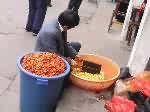
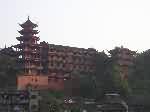
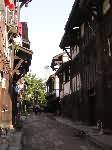
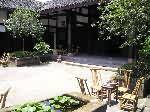
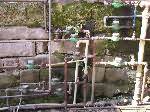
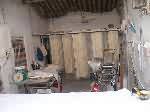
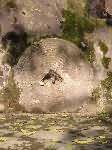
 Copyright © 1998-2026 All rights reserved.
Copyright © 1998-2026 All rights reserved.